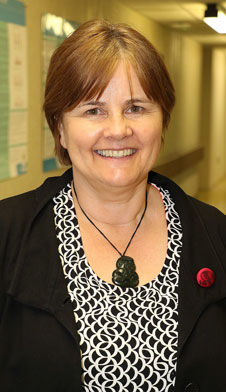 Thursday 15 October 2015 4:59pm
Thursday 15 October 2015 4:59pm
Lead researcher Bridget Robson
Twenty reports which provide snapshots of Māori health in District Health Board regions all around New Zealand have been released today.
The Māori Health Profiles for 2015 were researched and compiled by the Eru Pōmare Māori Health Research Centre, at the University of Otago, Wellington. Commissioned by the Ministry of Health, they focus on the health status of Māori, and reveal where there are inequalities compared to non-Māori.
Lead researcher Bridget Robson says the statistics in the reports will be a useful resource for each District Health Board for making their health plans and decisions on where to spend their resources. The profiles are publicly available and can be used by any individual or organisation with an interest in hauora Māori.
“The profiles provide information for Māori in communities, in services providing health care, and on boards making decisions about health spending,” says Ms Robson.
The 20 profiles contain up-to-date information about the Māori population in each area, hospitalisations, mortality and injuries for individuals as well as at family and community levels.
They include indicators of whānau wellbeing, healthy environments, health service use and health status. They contain data about Māori and non-Māori infants, children, rangatahi and adults and by household.
“The profiles remind us that stark inequalities in health continue. They provide a useful base for identifying key issues and planning actions to improve Māori health,” Ms Robson says.
Links to reports: otago.ac.nz/MHP2015
Read more: District Health Board Māori Health Profiles 2015 Q&As
For further information, contact:
Bridget Robson
Mob +64 27 240 9258
Email bridget.robson@otago.ac.nz
Web otago.ac.nz/wellington
Background about Eru Pōmare Māori Health Research Centre
Te Rōpū Rangahau Hauora A Eru Pōmare (Eru Pōmare Māori Health Research Centre) strives to create a Kaupapa Māori space committed to improving Māori health outcomes and eliminating inequalities through quality science and ongoing theoretical development. Its approach is consistent with the Treaty of Waitangi, and is engaged with community through a spectrum of influence from community development, policy advocacy, research dissemination and Māori health research workforce development.
A list of Otago experts available for media comment is available elsewhere on this website.
Electronic addresses (including email accounts, instant messaging services, or telephone accounts) published on this page are for the sole purpose of contact with the individuals concerned, in their capacity as officers, employees or students of the University of Otago, or their respective organisation. Publication of any such electronic address is not to be taken as consent to receive unsolicited commercial electronic messages by the address holder.
